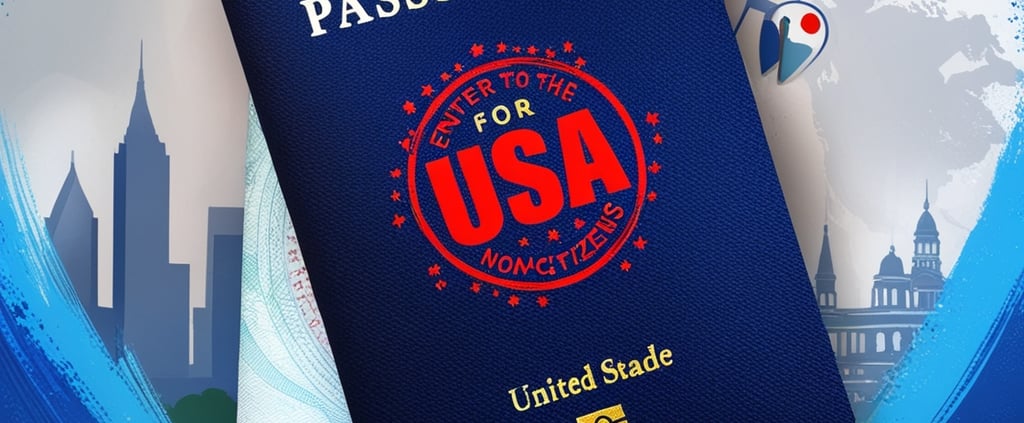3 Travel Tips for noncitizen travel Entering the USA
The travel noncitizen travel can be complex. This guide provides essential tips for green card holders and visa travelers, including customs questions, rights protection, and digital safety at borders. Prepare for a smooth experience through U.S. immigration procedures.
Md Abdullahel Kafi
4/23/20253 min read


3 Tips to Enter the USA for Noncitizens
Traveling back to the United States can be stressful, especially if you’re not a U.S. citizen. Whether you’re a green card holder or traveling on a visa, navigating border security requires preparation and composure. Many travelers experience anxiety due to the possibility of being questioned, detained, or searched by Customs and Border Protection (CBP) officers. To make the process easier, here are three essential tips to help you enter the United States safely and with peace of mind.
Tip 1: Answer Only the Questions Asked
One of the most important rules when interacting with CBP officers is to provide only the information they specifically ask for—nothing more and nothing less. When asked about the purpose of your trip, keep your response simple and straightforward. For example, if the officer inquires why you are entering the country, you might say, “I’m visiting my cousin,” or “I’m returning home after visiting family abroad.” Avoid elaborating further unless prompted.
Sharing unnecessary details can complicate your interaction. For instance, handing over documents, receipts, or flight information without being asked could lead to additional scrutiny. CBP officers might interpret extra information as a reason to dig deeper into your case, potentially prolonging the questioning process.
That said, ensure you present any required documents, such as your visa or green card, when requested. These should be readily accessible to avoid delays. However, resist the temptation to offer explanations or justifications that go beyond what is asked. By focusing solely on the officer’s questions, you’ll minimize misunderstandings and keep the process efficient.
Tip 2: Stay Calm, Composed, and Honest
Maintaining your composure and telling the truth are crucial during interactions with CBP officers. Anxiety can sometimes lead travelers to overthink their responses, which increases the risk of saying something incorrect or misleading. If you’re unsure of an answer, it’s perfectly acceptable to say, “I don’t know.” Providing truthful and concise answers builds trust and ensures smoother interactions.
Lying or providing inaccurate information, even unintentionally, can have serious consequences. For example, one traveler shared that when asked where his company was located, he incorrectly said “New York” instead of “Chicago.” He later explained that he panicked, assuming the officer would question why he was flying into a New York airport when his workplace was in Chicago. Unfortunately, this small lie led to his denial of entry.
The takeaway here is to always be honest. Even if a question catches you off guard, take a moment to think before answering. A truthful response, even one as simple as “I’m not sure,” is far less damaging than being caught in a lie. Honesty and composure go a long way in ensuring a hassle-free border experience.
Tip 3: Be Mindful of Your Devices and Their Content
CBP officers have the authority to inspect your electronic devices, such as phones, laptops, and tablets, if you are not a U.S. citizen. While this is within their rights, it can lead to complications if your device contains information that could raise questions or cause confusion.
To avoid potential issues, ensure your devices are free of sensitive or questionable content. If possible, use a different device for travel or delete unnecessary information from your primary phone before departing. For example, personal photos, messages, or files that could be misinterpreted should be removed to reduce the likelihood of misunderstandings.
Remember, carrying a device is not mandatory. Some travelers choose to leave their phones or laptops behind to simplify the process. After your trip, you can easily restore any deleted data or re-sync your device with your backups. By proactively managing your device content, you can minimize the chances of being detained or questioned unnecessarily.
Bonus Tip: Protect Your Green Card Rights
For green card holders, an additional tip is critical: never sign any document to surrender your green card, no matter the circumstances. CBP officers cannot force you to relinquish your status, though they may detain you if there are concerns about your admissibility. Signing away your green card voluntarily could have severe repercussions, including losing your permanent resident status.
If you ever feel pressured or uncertain during your interaction with CBP officers, remain calm and seek legal assistance. It’s essential to understand your rights and exercise them responsibly.
Final Thoughts
Traveling as a noncitizen can be daunting, but following these tips will help you navigate the process with confidence and ease. Answer only the questions asked, remain calm and truthful, and carefully manage the information on your electronic devices. These straightforward strategies can make a significant difference in how smoothly you pass through customs and border protection.
If you encounter challenges or need assistance, don’t hesitate to reach out to a qualified immigration attorney. Staying informed and prepared is the key to entering the United States safely and without unnecessary stress. Share this guide with friends or family members who might benefit, and safe travels!
